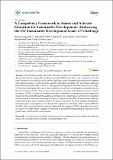Files in this item
A competency framework to assess and activate education for sustainable development : addressing the UN Sustainable Development Goals 4.7 Challenge
Item metadata
| dc.contributor.author | Giangrande, Naresh | |
| dc.contributor.author | White, Rehema Mary | |
| dc.contributor.author | East, May | |
| dc.contributor.author | Jackson, Ross | |
| dc.contributor.author | Clarke, Tim | |
| dc.contributor.author | Saloff Coste, Michel | |
| dc.contributor.author | Penha-Lopes, Gil | |
| dc.date.accessioned | 2019-05-17T14:30:05Z | |
| dc.date.available | 2019-05-17T14:30:05Z | |
| dc.date.issued | 2019-05-17 | |
| dc.identifier | 258912136 | |
| dc.identifier | c3bcd4e0-4d1c-469f-98d2-721dc65535f2 | |
| dc.identifier | 85067133655 | |
| dc.identifier | 000471010300115 | |
| dc.identifier.citation | Giangrande , N , White , R M , East , M , Jackson , R , Clarke , T , Saloff Coste , M & Penha-Lopes , G 2019 , ' A competency framework to assess and activate education for sustainable development : addressing the UN Sustainable Development Goals 4.7 Challenge ' , Sustainability , vol. 11 , no. 10 , 2832 . https://doi.org/10.3390/su11102832 | en |
| dc.identifier.issn | 2071-1050 | |
| dc.identifier.other | ORCID: /0000-0002-9669-0012/work/64697349 | |
| dc.identifier.uri | https://hdl.handle.net/10023/17719 | |
| dc.description | This research was supported by Gaia Education. G.P-L was funded by Fundação para a Ciência e Tecnologia (Contract number IF/00940/2015). | en |
| dc.description.abstract | The UN Transforming our World: The 2030 Agenda for Sustainable Development (herein, Agenda 30) and the Sustainable Development Goals (SDGs) offer both a set of aspirations for the kind of future we would like to see for the world and a suite of targets and indicators to support goal implementation. Goal 4 promotes quality education and Target 4.7 specifically addresses Education for Sustainability. However, creating a monitoring and evaluation framework for Target 4.7 has been challenging. The aim of this research was to develop a meaningful assessment process. We used a dialogical intervention across complementary expertises and piloted concepts in a trainer workshop. We then developed a modified competency framework, drawing on previous competency models but innovating through the addition of intrapersonal competencies, a self-reflective validation scheme, a focus on non-formal learning, and specific alignment with SDG 4.7 requirements. Through exploration of how such learning could be activated, we proposed the use of multiple intelligences. Education plays a synergistic role in achieving the aspirations embedded within Agenda 2030 and the SDGs. We concluded that Education for Sustainable Development (ESD) will require individuals to acquire ‘key competencies’, aligning with notions of transformational learning, in addition to other generic and context specific competencies. | |
| dc.format.extent | 16 | |
| dc.format.extent | 972992 | |
| dc.language.iso | eng | |
| dc.relation.ispartof | Sustainability | en |
| dc.subject | Education for sustainable development | en |
| dc.subject | Key competencies | en |
| dc.subject | Sustainable development goals | en |
| dc.subject | SDG 4 | en |
| dc.subject | Transformative learning | en |
| dc.subject | Evaluation framework | en |
| dc.subject | GF Human ecology. Anthropogeography | en |
| dc.subject | LB Theory and practice of education | en |
| dc.subject | NDAS | en |
| dc.subject.lcc | GF | en |
| dc.subject.lcc | LB | en |
| dc.title | A competency framework to assess and activate education for sustainable development : addressing the UN Sustainable Development Goals 4.7 Challenge | en |
| dc.type | Journal article | en |
| dc.contributor.institution | University of St Andrews. School of Geography & Sustainable Development | en |
| dc.contributor.institution | University of St Andrews. Centre for Higher Education Research | en |
| dc.contributor.institution | University of St Andrews. Scottish Oceans Institute | en |
| dc.contributor.institution | University of St Andrews. St Andrews Sustainability Institute | en |
| dc.identifier.doi | https://doi.org/10.3390/su11102832 | |
| dc.description.status | Peer reviewed | en |
| dc.identifier.url | https://www.mdpi.com/journal/sustainability/special_issues/Competencies_ESD | en |
| dc.identifier.url | https://www.mdpi.com/2071-1050/11/10/2832 | en |
This item appears in the following Collection(s)
Items in the St Andrews Research Repository are protected by copyright, with all rights reserved, unless otherwise indicated.

